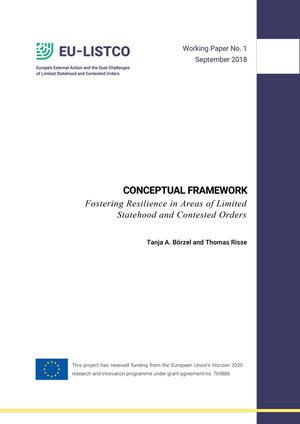
EU-LISTCO starts from the assumption that Europe’s internal and external environment is characterized by two risk factors, which represent challenges for the external action of the EU and its member states:
- Areas of limited statehood (ALS), in which central government authorities and institutions are too weak to set and enforce rules and/or do not control the monopoly over the means of violence. Such areas of limited statehood are ubiquitous. They characterise large parts of the regions surrounding the EU in the East and in the South. However, areas of limited statehood are neither ungoverned nor ungovernable. Some ALS are reasonably well governed by a whole variety of actors – state and non-state, domestic/local and international, while others are not. The challenge for EU foreign policy is to foster good governance in areas of limited statehood.
- Contested orders (CO), in which state and non-state actors challenge the norms, principles, and rules according to which societies and political systems are or should be organised. At the global and regional level, powers such as Russia and – somewhat less aggressive – China call the liberal and law-based order into question. The Trump administration in the United States adds a new dimension to order contestations by appearing to turn away from the liberal international order which the U.S. itself was instrumental in creating. Finally, and domestically, Western and non-Western societies struggle with the rise of actors that question their current political and legal order from the inside as well as from the outside. The challenge for EU foreign policy is to foster conditions in which order contestations remain peaceful and do not contribute to governance breakdowns in areas of limited statehood.
Neither limited statehood nor contested orders will go away. They create vulnerabilities and pose risks, but they do not in themselves amount to threats to the EU. Only if and when areas of limited statehood and contested orders deteriorate into governance breakdowns and violent conflict, do the risks turn into threats to the security and stability of the EU, its member states, and citizens. The main research task of EU-LISTCO is to investigate the “tipping points” at which risks of limited statehood and contested orders turn into threats leading to governance breakdowns and violent conflict.
Two factors are decisive in affecting such tipping points:
- Global, diffuse, and regional risks, such as nuclear proliferation, transnational terrorism, economic crises, aggressive powers, cyber threats, and climate change, are likely to promote governance breakdowns and violent conflict in areas of limited statehood and contested orders.
- Resilience is likely to help societies to sustain good and effective governance at the local/domestic as well as regional levels. We understand resilience as the “capacity of societies, communities and individuals to manage opportunities and risks in a peaceful and stable manner, and to build, maintain or restore livelihoods in the face of major pressures.” (European Commission & High Representative of the Union for Foreign Affairs and Security Policy, 2017, 3).
In other words, the various risks, on the one hand, and resilience, on the other, affect tipping points in opposite ways. Whether or not risks turn into threats for European security then depends on the extent to which resilient societies can successfully contain these risks through effective and legitimate governance at the local, domestic, and regional levels.
Last but not least, we use three indicators to measure degrees of resilience:
- Social trust in societies and local communities;
- Legitimacy (or social acceptance) of governance actors and institutions at the various levels;
- Institutional design of local, domestic, and regional governance arrangements including what is left of central state institutions.
Research in EU-LISTCO – particularly Work Packages 2, 3, and 4 – will focus on exploring the relationships between the various factors outlined above which affect the tipping points between risks and threats. The remainder of this paper introduces the various concepts used in the framework in more detail, namely areas of limited statehood, governance, contested orders, threats, resilience, as well as the three factors fostering the latter.